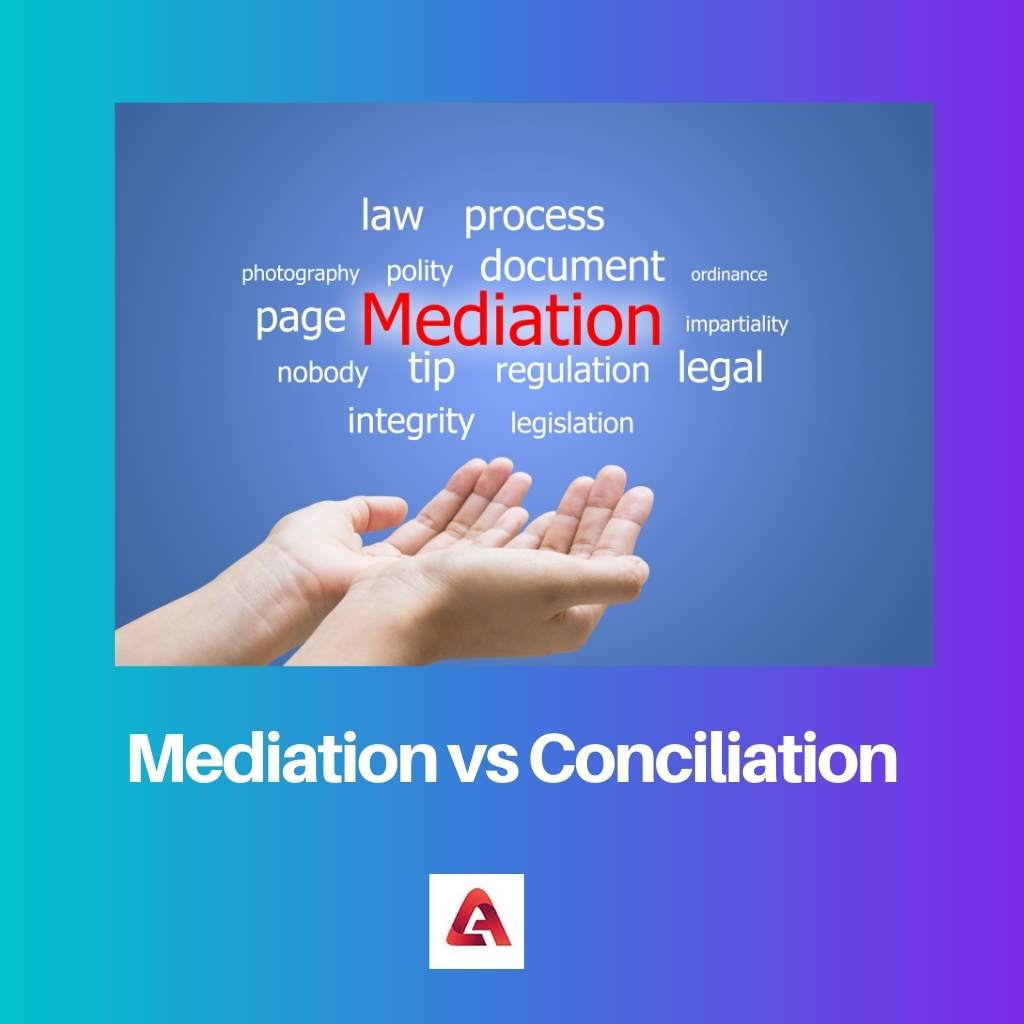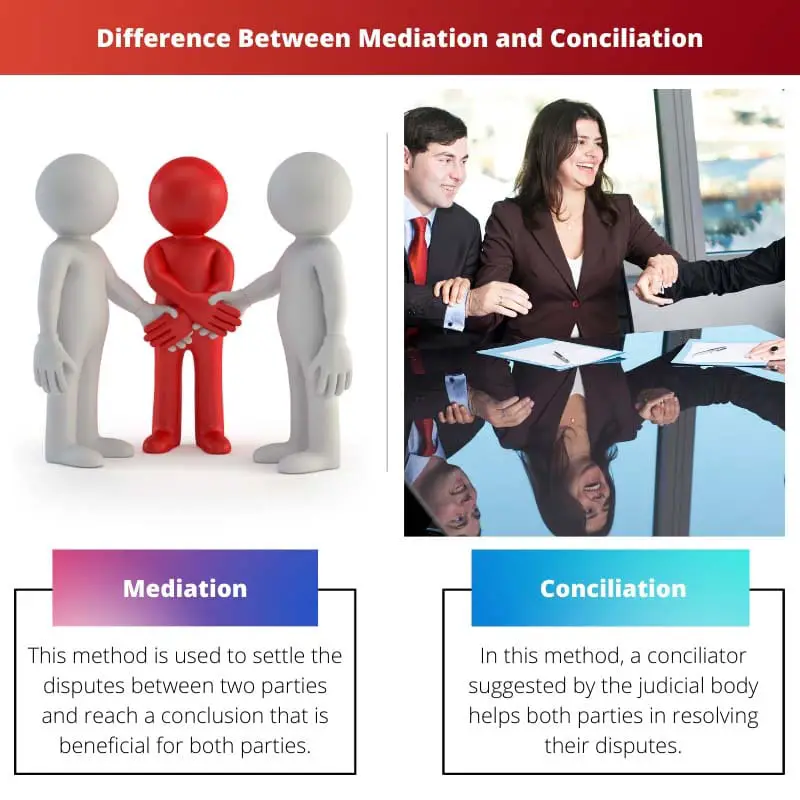People face many disputes, and settlement is not that easy. Therefore there are so many governing bodies with the help of which one can easily solve their disputes using legal ways.
Third-party advice is always recommended because one can become easily aggressive or violent during any dispute.
Mediation and Conciliation are types of dispute settlement agencies which help two groups to settle their matter legally and with no violence.
These are the easiest way of solving matters at a low cost and without going to any judiciary forums or judicial bodies.
They tell about the rights of a person according to the law or constitution after listening to both parties.
Key Takeaways
- Mediation is when a neutral third party helps two parties in a dispute reach a mutually acceptable agreement. At the same time, Conciliation is a process in which a third party facilitates communication and negotiation between the parties to resolve the dispute.
- Mediation is voluntary and non-binding, while Conciliation can be voluntary or mandatory and may result in a binding decision or settlement.
- Mediation is more focused on helping the parties to come up with their solution, while Conciliation involves the third party playing a more active role in the process.
Mediation vs Conciliation
Mediation is a settlement process between two parties. This method is used to find a solution which gives benefits to both parties. There is only one advisor in the mediation method. In the conciliation method, a person is selected as a conciliator. A conciliator helps in resolving the issue. There can be one or more advisors or conciliators in the conciliation process.

Mediation is a third-party process that helps people to settle out their disputes without the use of violence. People who do not want to face judiciary or judicial forums are suggested to go through these processes as it sorts out the matter between two parties without court interference.
Conciliation sorts out the disputes but by legal suggestion only, and this method of solving the dispute is suggested by judicial authorities to the parties. This act was launched or introduced in 1996, and it is regulated by the arbitration and conciliation act for solving disputes.
Comparison Table
| Parameters of Comparison | Mediation | Conciliation |
|---|---|---|
| Definition | This method is used to settle the disputes between two parties and reach a conclusion that is beneficial for both parties. | In this method, a conciliator suggested by the judicial body helps both parties in resolving their disputes. |
| No. of advisors | The mediation process involves only one advisor or mediator. | The conciliation process can have more than one advisor or conciliator. |
| Privacy | A confidentiality clause is signed by the parties, or a normal build-up of trust is made between the parties. | The judicial body or the law fixes the privacy guarantee. |
| Result | The result which is concluded is beneficial to all parties. | Result conclusion should be reasonable and beneficial to all parties. |
| Solution process | Usually, both the parties and the mediator conclude the solution together. | Mostly the conciliator proposes a solution that can be opted by the parties. |
| Nature of the advisor | In the mediation process, the mediator considers the suggestions of the parties as well. | In conciliation, the advisor or conciliator has a more important role as compared to the mediator. |
What is Mediation?
The mediation process involves a third party which concludes a solution for a matter between two parties who do not want to face court or judicial procedures. This method involves a mediator who advises both parties and listens to their suggestions.
This process is governed by the Code of civil procedure act of 1908. Mediation can opt by the parties personally, or the judicial bodies can suggest it. During this process, no violence is used.
Instead, everyone calmly suggests their ideas or options than the mediator makes a conclusion with impartiality.
A mediator cannot enforce his decisions to the parties if opted personally but is suggested by the court to the parties, his decision can be enforced, or the decision can be taken to court if not sorted personally. It is one of the ancient methods of solving disputes.

What is Conciliation?
The courts recommend conciliation for people who are not able to solve their matters personally. In this process, a conciliator is appointed who helps the parties to conclude solutions beneficial to both parties without using any violence.
The Arbitration and conciliation Act of 1996 regulates this process. And it is introduced much later than the Mediation method. The role of the Conciliator is very important as the decisions made by the conciliator are legal and can be enforced on the parties.
There are two types of Conciliation methods one is voluntary, and the other is compulsory. In the voluntary process, both parties contribute their decisions one by one. In the compulsory process, the conciliator’s conclusion or the conciliator’s suggestion is given importance.

Main Differences Between Mediation and Conciliation
- This Mediation is used for settling disputes between two parties and reaching a beneficial conclusion for both parties. While in the Conciliation method, the conciliator suggested by the judicial body helps both parties in resolving their disputes.
- In Mediation, usually, both the parties and the mediator conclude the solution together. Whereas in the Conciliation method, the conciliator proposes a solution that can be opted for by the parties.
- The conciliation process can have more than one advisor or conciliator. But in the case of the Mediation process, there is only one mediator who solves the dispute.
- In the Mediation method confidentiality clause is signed by the parties, or a normal build-up of trust is made between the parties. While in the Conciliation process, the judicial body or the law fixes the privacy guarantee.
- In Conciliation result conclusion should be reasonable and beneficial to all parties. While in Mediation, the result which is concluded is beneficial to all parties.

- https://heinonline.org/hol-cgi-bin/get_pdf.cgi?handle=hein.journals/jsouafl1998§ion=25
- https://www.jstor.org/stable/3877881

The historical and legal background of mediation and conciliation provides a comprehensive context for appreciating their significance in the contemporary legal landscape.
The insights into the genesis and statutory underpinnings of mediation and conciliation enrich our understanding of these practices, highlighting their evolution as essential facets of modern legal systems.
Absolutely, understanding the origins and regulatory frameworks of mediation and conciliation is crucial for appreciating the evolution of these dispute resolution mechanisms and their enduring relevance.
The meticulous exploration of the historical, legal, and procedural dimensions of mediation and conciliation encapsulates the depth and intricacy of these dispute resolution methods, underlining their instrumental role in shaping a fair and equitable legal landscape.
Absolutely, the holistic examination of the various facets of mediation and conciliation offers a comprehensive perspective on their pragmatic and adaptive approaches to resolving disputes, thereby exemplifying their enduring relevance in contemporary legal practices.
The fundamental differences between mediation and conciliation highlight the importance of having tailored approaches for resolving disputes, ensuring that the needs of each party are duly addressed.
Indeed, the personalized nature of mediation and conciliation allows for flexible solutions that consider the unique circumstances of each dispute, steering clear of a ‘one-size-fits-all’ approach.
The ability of mediation and conciliation to strike a balance between autonomy and guidance in dispute resolution is commendable, as it empowers parties to actively participate in the process while benefiting from expert assistance.
Mediation and Conciliation are essential mechanisms for protecting the rights of individuals involved in disputes while also preventing unnecessary escalations that could lead to violent confrontations.
That’s correct, mediation and conciliation are rooted in providing fair and practical solutions to disputes through peaceful dialogue and negotiation.
The distinct characteristics of mediation and conciliation make them valuable tools in the legal landscape, as they enable parties to engage in a constructive problem-solving process that yields mutually acceptable outcomes.
The comparison table effectively illustrates the nuanced distinctions between mediation and conciliation, providing valuable insights into the guiding principles of these two dispute resolution methods.
The level of detail presented in the comparison table is commendable, as it contributes to a comprehensive understanding of the procedural variances and underlying objectives of mediation and conciliation.
Absolutely, the clarity and precision offered by the comparison table serve as a useful reference for understanding the intricacies of mediation and conciliation, shedding light on their unique features and applications.
Dispute resolution can be a complex process that requires expert guidance. Mediation and Conciliation are effective ways of settling disputes legally without resorting to violence or going to court.
The use of Mediation and Conciliation not only saves time and money but also promotes harmony and goodwill between the parties involved. It’s a great alternative to traditional legal proceedings.
I agree, the intervention of a neutral third party can play a key role in resolving conflicts and ensuring that both parties are treated fairly.
The inherent nature of mediation and conciliation to uphold privacy, voluntary participation, and fair decision-making underscores their pivotal role in ensuring equitable and amicable settlements of disputes.
Absolutely, the procedural assurances and principles embedded in mediation and conciliation engender confidence in their ability to foster a balanced, non-coercive, and inclusive process of conflict resolution.
The legal framework governing the processes of mediation and conciliation underlines the commitment to ensuring fairness, privacy, and enforceability of solutions, thereby establishing a robust foundation for dispute resolution.
Indeed, the statutory provisions governing mediation and conciliation demonstrate a meticulous approach to safeguarding the rights and interests of all parties involved, fostering the legitimacy and efficacy of these methods.
The in-depth exploration of the comparative features of mediation and conciliation contributes valuable insights into their distinct operational dynamics, fostering a nuanced understanding of their applicability in diverse contexts.
Indeed, the granular examination of the parameters and attributes of mediation and conciliation elucidates the multifaceted nature of these methods, highlighting their capacity to address a spectrum of disputes with precision and efficacy.
The comprehensive analysis of the distinguishing attributes of mediation and conciliation offers an informed framework for evaluating their suitability for various dispute resolution scenarios, promoting informed decision-making and strategic application.
Mediation and Conciliation are crucial for maintaining peace and order in society by providing peaceful and cost-effective ways to resolve disputes.
Absolutely, mediation and conciliation offer a civilized and non-violent approach to dispute resolution, paving the way for fair and just outcomes for all parties involved.